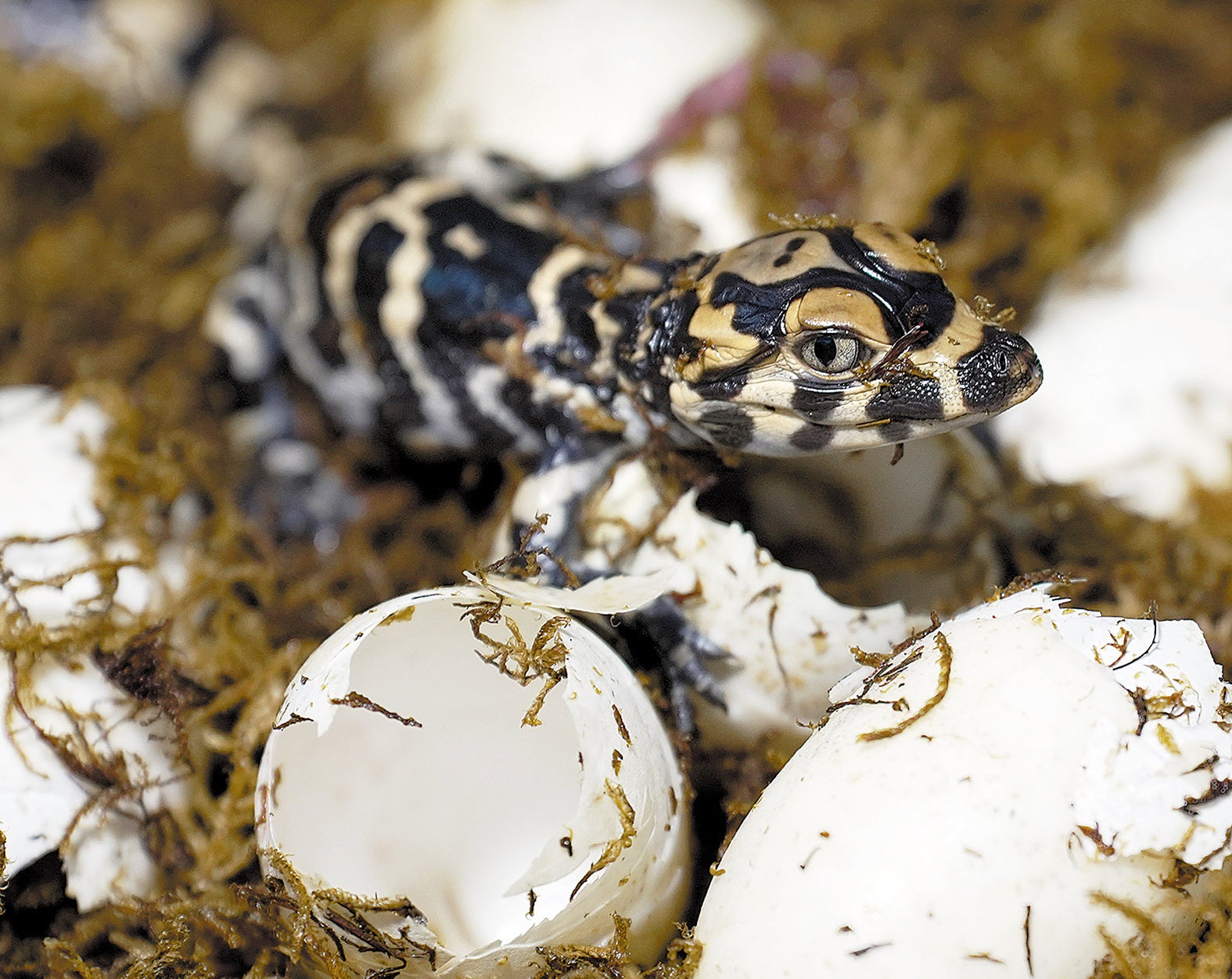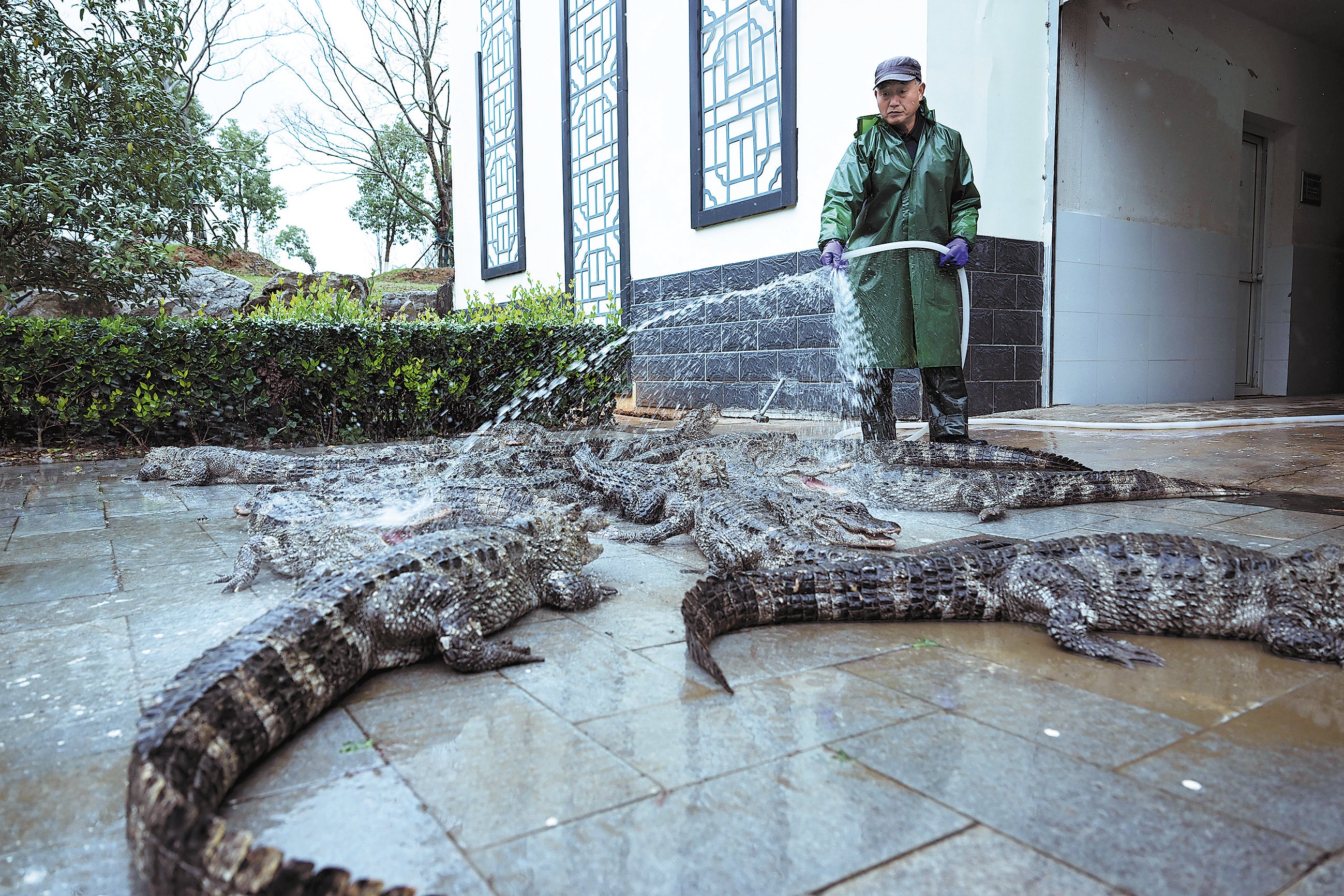Protective measures help Chinese alligators thrive
THE ARTICLES ON THESE PAGES ARE PRODUCED BY CHINA DAILY, WHICH TAKES SOLE RESPONSIBILITY FOR THE CONTENTS

Almost every morning, She Shizhen takes a stroll around the Hongxing Reservoir in Zhangcun village, Xuancheng, Anhui province. The 84-year-old is not strolling for fun, though: she is a volunteer who patrols the area that is home to Chinese alligators, aka the Yangtze alligator, a reptile she cherishes dearly.
In 1982, some members of She’s family discovered a nest of strange-looking eggs. Her husband, Zhang Xuhong, guessed that they were “Earth Dragon” eggs. Like the giant panda, Chinese alligators enjoy first-class State protection, and the local people refer to them as “Earth Dragons”.
Zhang took the eggs to experts for identification, and they confirmed that they were those of the Chinese alligator.
That led to the Hongxing Reservoir becoming a protected area for the animals. The experts entrusted Zhang and She, who lived about 328 feet from the water, to “protect these endangered animals”, in She’s words.
Chinese alligators, a rare species unique to China, are mainly distributed in southeastern Anhui, including the counties of Jingxian, Guangde, Langxi and Nanling, and Xuanzhou district in Xuancheng city.
They are referred to as “living fossils” because they belong to the same era as the dinosaurs and have existed for more than 200 million years. They were once widely distributed across the Yellow, Huaihe, Yangtze and Qiantang rivers, and other river basins, but their habitat gradually shrank to the lower reaches of the Yangtze as a result of human activities and climate change.
In 2001, the wild alligator population reached its lowest point, becoming critically endangered with fewer than 120 individuals.
In May, though, the population in the wild had reached about 1,200 – three times the number recorded in a 2021 field survey.
For decades, Zhang and She patrolled the reservoir, urging villagers to stop fishing with nets and promoting the importance of alligator protection.
She said that during the day, she and her husband observed the alligators’ activity around the reservoir, and at night Zhang sat under a lamp, diligently recording every detail of the alligators’ activities. The couple even continued their vigil during the animals’ annual hibernation period.

Zhang, who died in 2005, wrote 23 journals about the protection of Chinese alligators. In them, he recorded details such as patrol times, the number of alligators spotted, weather conditions and vocalisation patterns.
He Shaowei, director of the management bureau at the Anhui Chinese Alligator National Nature Reserve, said the notebooks provide important reference materials for experts involved in domestic and international scientific research.
She remembers that when the reservoir dried up in 1982, some villagers came to fish, and she and her husband couldn’t sleep well at night. They were afraid that the alligators would be harmed, so they stayed by the reservoir, politely asking the fishermen to cease their activity. Eventually, they managed to stop the villagers from fishing.
In 2003, concerned about some hatchling alligators on a small island in the reservoir that were being stalked by egrets, She and Zhang began bringing the newborns to their home to raise them and boost their survival rate.
At the time, a national conservation base was established in the area. The staff members dug a pond and installed a light bulb above their door to facilitate feeding the young alligators with insects attracted by the light at night. As the alligators grew, they were sent to a Chinese alligator breeding farm in Xuancheng for further protection and care.
After Zhang Xuhong died, She often went to the small island by boat to check on the alligators. In 2018, her eldest son Zhang Honghua became a new guardian of the alligators. Now, the elderly mother and her 64-year-old son patrol the area every day, braving all kinds of weather as they remain dedicated to their task of safeguarding the alligators in the wild.
